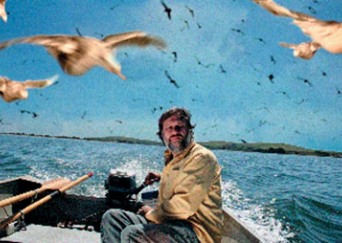 On January 16, the IFC Center will begin a week-long run of THE PERVERT’S GUIDE TO CINEMA, directed by Sophie Fiennes. You can read my description here from its North American premiere at the 2006 Toronto International Film Festival. Since then, PERVERTS has gained a cult reputation based on only a few screenings in the U.S. Yesterday, the film played for one night at the Jacob Burns Film Center in Westchester. Afterwards, I moderated a discussion with Fiennes in which she elaborates on her collaboration with Slavoj Zizek. She is currently planning a follow-up film with Zizek called THE PERVERT’S GUIDE TO IDEOLOGY. Here are a few edited excerpts from last night’s conversation…
On January 16, the IFC Center will begin a week-long run of THE PERVERT’S GUIDE TO CINEMA, directed by Sophie Fiennes. You can read my description here from its North American premiere at the 2006 Toronto International Film Festival. Since then, PERVERTS has gained a cult reputation based on only a few screenings in the U.S. Yesterday, the film played for one night at the Jacob Burns Film Center in Westchester. Afterwards, I moderated a discussion with Fiennes in which she elaborates on her collaboration with Slavoj Zizek. She is currently planning a follow-up film with Zizek called THE PERVERT’S GUIDE TO IDEOLOGY. Here are a few edited excerpts from last night’s conversation…
Audience member: Can you tell us how this project originated and the background of the narrator?
Sophie Fiennes: Slavoj Zizek is a philosopher or cultural theorist, depending on how you want to name him. He is a Freudian, Lacanian philosopher, psychoanalyst – not a practicing psychoanalyst. He’s written about 30 books. I had made a documentary previous to this called HOOVER STREET REVIVAL which was about a Pentecostal church community in Los Angeles. A friend of mine said, “You should meet Slavoj Zizek cause he’s written a lot about religion.” So I started reading Slavoj and realized he was always referring to films. I read the book “Enjoy Your Symptom!” and this idea came about.
In a book you could only go so far in exploring what he was saying about films. I thought, let’s put those ideas to the films as a way of talking about them in their own form. I have a friend who is a practicing psychoanalyst in London and knew Slavoj. He made the introduction over email. We made a plan to meet in a university town where he was lecturing. He said to me, “What’s your transcendental agenda? What do you want to do?” I saw my agenda as an opportunity to look at moments in films rather than this idea of plot. If you are ever trying to make a film, everything you are told in script development is about the plot and character identification. But for me, watching a film, I always think that the narrative is there to serve critical moments where you as the audience suddenly shift psychically by what the moment delivered. That is why it has this emphasis.
Powers: Did making PERVERTS give you a new appreciation for the films it covers?
Fiennes: Everything Slavoj had to say about Hitchcock is completely riveting. And I loved what he had to say about David Lynch because he was a very important filmmaker for me. He really sheds light on the whole premise of Lynch. Throughout all of Lynch’s films you can see the duality between what he is fantasizing and what is real.
At one point, I was presenting the film to TV commissioners and felt it wasn’t enough to say it’s only going to be this Slovenian philosopher talking. We were trying to sell that we’d speak to Walter Murch, David Lynch and others. So I flew Slavoj to Los Angeles to do an interview with David Lynch. A half an hour before the interview, Lynch canceled. I mean, we’d flown all the way over there! Just the other day I said, “I’m really sorry, Slavoj. We dragged you all the way there.” And he said, “No, no, don’t worry. I was terrified to interview David Lynch.”
Powers: In the film, you place Slavoj in scenes recreated from movies. Can you tell me about filming on the location of the hotel room from THE CONVERSATION? You took it to an extreme of being authentic.
Fiennes: Oh yeah, that is absolutely THE room, THE toilet, the exact place of the scene. If you know the film, Gene Hackman has lots of trouble getting into the room. I had the uncanny experience of also trying to explain to the receptionist why I absolutely had to stay in the room. What I discovered is that the hotel is still there, and everything has been preserved. It was one of those organic things that developed.
Powers: I have heard Slavoj say that he hates to watch himself on screen. Has he watched the film?
Fiennes: No, he tells me that he’s never seen the film at all. When we had a screening at MoMA, he came into the projection room and went running to hide in the loo because he couldn’t even hear himself speak. “Why do I have this ridiculous voice?,” he’d say. I think it’s good because if he did see himself, he’d probably become very self-conscious. I think it’s a deliberate thing.
Audience member: Do you see this film being used in cinema classes?
Fiennes: One of the reasons why I wanted to make it was that I attended a conference in London called “Media Literacy in the 21st Century”. I was the only filmmaker. It was all teachers teaching film. One of the people in my group said, “You know, we got to stop teaching kids Hitchcock.” I thought that was ridiculous and pathetic. So this is my revenge on that teacher.







